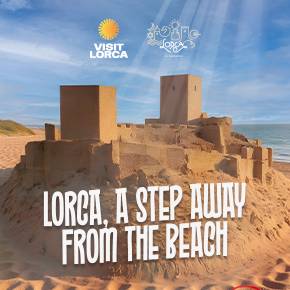- Region
- Vega baja
- Marina Alta
- Marina Baixa
- Alicante
- Baix Vinalopo
- Alto & Mitja Vinalopo
-
ALL TOWNS
- ALICANTE TOWNS
- Albatera
- Alfaz Del Pi
- Alicante City
- Alcoy
- Almoradi
- Benitatxell
- Bigastro
- Benferri
- Benidorm
- Calosa de Segura
- Calpe
- Catral
- Costa Blanca
- Cox
- Daya Vieja
- Denia
- Elche
- Elda
- Granja de Rocamora
- Guardamar del Segura
- Jacarilla
- Los Montesinos
- Orihuela
- Pedreguer
- Pilar de Horadada
- Playa Flamenca
- Quesada
- Rafal
- Redovan
- Rojales
- San Isidro
- Torrevieja
- Comunidad Valenciana
article_detail
Spanish News Today Editors Roundup Weekly Bulletin May 23
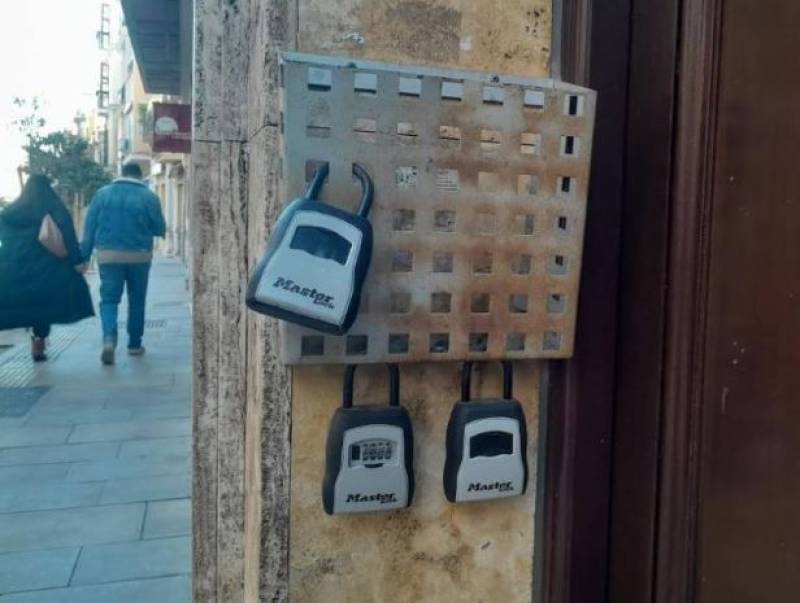
TOP STORIES: "Tourism crackdown as Airbnb ordered to block 65,000 illegal holiday lets" & "Spanish study needs 10,000 volunteers to drink wine every day"
It’s all been kicking off this week. Last Saturday’s Eurovision Song Contest created controversy when Israel (not in Europe) surged into third place with the public vote. It shamefaced Spain, whose politicians have recognised the State of Palestine but whose Eurovision voters gave the Israeli act the maximum 12 points. It has prompted calls to look into how voting and choice of acts is organised in the competition.
Meanwhile, Netanyahu decided to go full Putin mode and the EU is finally sitting up to take notice, or at least to maybe discuss the possibility of thinking about placing sanctions on Israel for what may or may not be planned ethnic cleansing in the Gaza Strip. And it only comes 15 months after Spain and Ireland asked the European Commission to do exactly that.
Meanwhile, in Spain itself, a series of happenings and mishaps in major companies we’re all familiar with – including Ryanair, Airbnb, Telefónica and Temu – mean changes to the way we live. For better or worse, you be the judge.
Ryanair
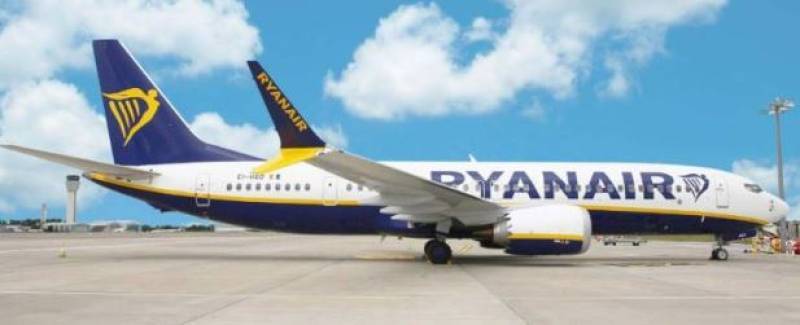
With summer just around the corner and holidays firmly on our minds, low-cost giant Ryanair has delivered the very welcome news that it is preparing to bump up its ticket prices this year, following a slump in profits despite flying a record number of passengers.
The airline’s latest figures show that although it carried 200.2 million travellers in the last fiscal year, which is a 9% increase, its profits dropped by 16%. But how exactly did this happen?
Ryanair says the main issue was cheaper fares. Average ticket prices fell by 7%, largely due to a sharp drop in bookings through online travel agencies. That led to frequent price cuts to stimulate demand. The company also pointed to higher marketing costs and the timing of Easter, which this year landed just outside the fiscal period, as contributing factors.
Now, Ryanair is changing course. Fares are expected to rise by around 5-6% during the upcoming peak travel season, according to CEO Michael O’Leary. Early indicators suggest demand for the current year is already strong, with prices beginning to recover.
But as it turns out, fare hikes aren’t the only turbulence Ryanair is facing. The airline is also dealing with a legal battle in Spain that could have wide-reaching effects on how budget airlines operate. A Spanish court in Salamanca recently ordered Ryanair to refund a passenger £124 in hand luggage fees charged across five flights between 2019 and 2024. The court ruled that cabin bags are an essential part of air travel and should not come with additional charges.
Legal experts are watching closely. Kevin Bodley, an aviation solicitor at Steele Raymond LLP, called the ruling “potentially significant,” saying it challenges the core business model of low-cost carriers that rely on charging extra for add-ons. If this decision becomes widely enforced in Spain, airlines may be forced to include cabin bags in base fares, likely pushing up ticket prices.
Ryanair, of course, maintains that its policy complies with EU regulations. Still, with Spain’s Ministry of Consumer Affairs encouraging refund claims, Ryanair could be facing further legal and financial headaches. And while this ruling doesn’t automatically apply across the EU, it might inspire similar challenges in other countries.
Airbnb

Spain finally seems to be getting serious about cracking down on illegal tourist rentals and has just taken aim at Airbnb. The government has ordered the platform to remove more than 65,000 short-term rental listings that it says do not meet legal requirements.
According to the Ministry of Social Rights, these listings, which include entire houses and apartments, break various regional rules across Spain, from missing licence numbers to not clearly stating whether the owner is a private individual or a company.
Airbnb has tried to appeal the decision, but the Madrid High Court has already told the company to take down 5,800 of the listings straight away while further investigations continue.
The affected properties are spread across some of Spain’s most popular tourist areas including Andalucía, Madrid, Catalonia, the Valencian Community, the Balearic Islands and the Basque Country.
Spain has been tightening its rules on tourist rentals in recent years, partly to help ease the housing crisis and partly to reduce the pressure of over-tourism in popular areas. Many of these Airbnb listings either lacked the correct registration, used fake or incorrect license numbers or failed to give renters the information they are legally entitled to.
In recent months, the Ministry has also opened investigations into other online portals for practices like forcing tenants to buy insurance or not clearly stating who is legally responsible for a rental.
Telefónica

So, on Tuesday morning, in the wee hours, Telefónica – Spain’s telecommunications giant – gave the country a surprise wake-up ‘call’ when the emergency phone number 112 stopped working in several regions of the country.
The outage started around 2am and lasted for several hours, up to and until people started to wake up. It was brushed off by Telefónica as a “one-off” issue “only affecting some companies”. The thing is one of those companies was the ambulance, fire and police service, which it turns out is kind of important, really.
The disruption affected the autonomous communities of the Valencian Community, Aragón and Extremadura, who all quickly rolled out a series of Plan B emergency phone numbers, which were just normal-length Spanish phone numbers. Part of the convenience of 112 (or 999 or 911, for that matter) is that it is so short, simple to remember and easy to call in an emergency. 0034 963 428 000 is not.
It was all back to normal by Tuesday lunchtime, thankfully. But coming as it does so hot
on the heels of the apagón (blackout) just three weeks ago and the recent transport system meltdowns between Madrid and Seville, you’ve got to wonder what the hell is going on with Spain’s infrastructure! Whatever next?
Cheap Chinese e-commerce sites

If it feels like you can’t scroll for five seconds without seeing an ad for Temu or Shein, you're not wrong. These ultra-cheap online shops have taken Europe by storm, shipping millions (actually, billions) of little parcels straight from China to shoppers all over the continent. But now the EU is planning a new move that might make those deals a tiny bit less tempting.
This week, the EU’s Trade Commissioner Maros Sefcovic told the European Parliament that they’re working on adding a €2 fee to small packages entering the EU. And yep, most of those are coming from China, thanks to platforms like Temu and Shein.
He described the wave of deliveries as an “enormous flood” and said customs just can’t keep up. The fee is meant to help cover the cost of checking all those parcels and making sure they meet EU safety and quality rules. It’s not a new tax, technically, just a way to manage the chaos better.
If the packages are going through special warehouses, the fee might be as low as 50 cents. But for everything else, think €2 per order. That’s still pretty minor, but it could add up if you’re used to filling your cart with lots of little things.
Murcia
It’s time to play the postcode lottery! More than 140,000 lucky residents of Murcia have been told this week that they will soon be swapping GPs, whether they like it or not, thanks to a grand game of musical chairs orchestrated by the regional health service. Before the end of this month, 106 family doctors (‘médico de cabecera’ in Spanish) are expected to begin new posts as a result of a transfer process that began back in July of last year and finally reaches its climax.
The grand plan is basically meant to fill over 400 gaps which have been identified in Murcia’s Primary Care sector, but there was been a severe lack of interest in taking up the scheme on the part of doctors. with only 141 applications and 106 approvals, over 300 spots are still left unclaimed, covered instead by a hodgepodge of temporary contracts. This reshuffle, then, aims to at least make sure every resident is covered by a GP, and by timing it for just before the summer holidays, the Murcia Health Service intends to minimise patient disruption… which probably means a lot of disruption, sorry.
In La Manga del Mar Menor, the president of a homeowners’ association has quite literally bitten off more than he could chew, namely part of his neighbour’s face. The incident, which took place during a heated debate over water damage back in 2014 and led to the community president biting another man, has finally reached its courtroom conclusion. The president was ordered to cough up €14,000 in damages to his neighbour, plus another €1,600 to the health service for the expenses incurred for patching up the victim’s chewed-up face, who claims he ended up not only with facial scarring but also PTSD.
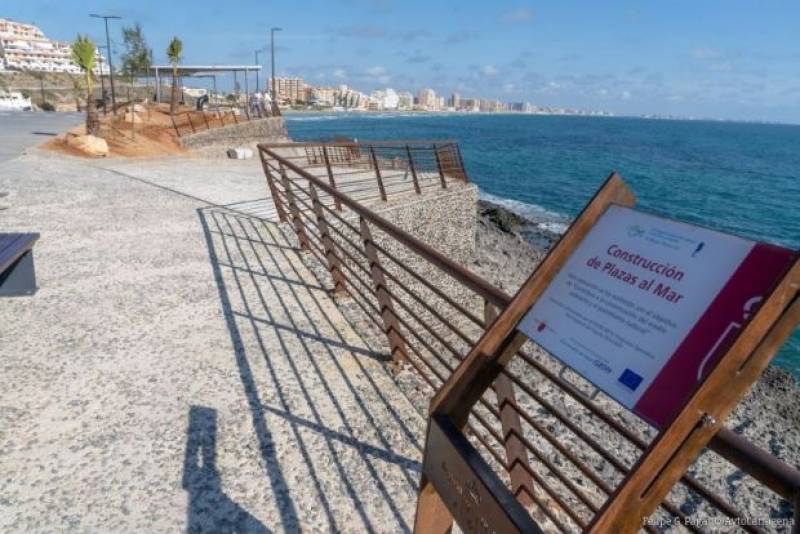 Speaking of costly misjudgements, the iconic Mirador Galúa viewpoint in La Manga, which was built just a short five years ago by Cartagena City Council using €786,772 of taxpayer money, is already falling apart and will soon undergo urgent repair. The scenic spot, designed as a heartfelt tribute to fallen air academy pilots, has now become a safety hazard as the metal railings have been rusted by the sea salt, according to the City Council themselves.
Speaking of costly misjudgements, the iconic Mirador Galúa viewpoint in La Manga, which was built just a short five years ago by Cartagena City Council using €786,772 of taxpayer money, is already falling apart and will soon undergo urgent repair. The scenic spot, designed as a heartfelt tribute to fallen air academy pilots, has now become a safety hazard as the metal railings have been rusted by the sea salt, according to the City Council themselves.The repairs will cost another €46,000 and will involve the installation of new wooden railings. The worst bit is, it seems that the wrong material was used for the viewpoint in the very beginning, so this additional expense could easily have been avoided.
Just down the road in the protected natural park of Calblanque, road closures were announced for this week. Roadworks began on Monday to improve the road infrastructure, meaning several days of inaccessible beach roads. In the East Sector, only authorised vehicles are allowed in until next Monday, while in the West, cars have been grudgingly allowed but lorries and buses are banned until the end of the month, just in case any tourists were hoping to arrive in a tour bus.
As if the roads weren’t already chaotic enough, a 74-year-old motorist took things to a new level this week by driving 20 kilometres the wrong way on the AP-7 near Cartagena. Emergency calls flooded in (112 was working there at that time) as fellow drivers tried to dodge the rogue pensioner in a moving hazard. When the Guardia Civil finally stopped him, the man refused to take a breathalyser test. Probably thought his driving itself was enough evidence of his unfitness to drive. Shockingly, this wasn’t his first offence. When police investigated further, they discovered that the man had pulled the same stunt just three days earlier in Valencia.
So apart from healthcare woes and traffic disruption, what’s on in the Region of Murcia? Looking ahead to August, Los Alcázares will be hosting a blast of musical nostalgia with the Mar Menor Music Legends festival on Thursday 7 and Friday 8 of that month. There will be tribute acts for Tina Turner and Robbie Williams, as well as a Backstreet Boys homage and a ‘Siempre Disco Party’ that promises hits from every decade.
With food trucks, DJs and chill-out zones, the Mar Menor Music Legends festival promises to be a summer highlight. It seems like a long way away, but tickets are on sale already, if you fancy getting ahead of the crowds.

For something a bit closer to now, you’ve got the TKO Radio Roadshow taking place at La Quinta at La Manga Club this coming Wednesday, May 28. This is the start of a summer filled with roadshows for the TKO team, and they will be getting in the mood with a poolside party full of live music, food, raffles and great prizes to be given away.
Entry is absolutely free, and you can just turn up on the day if you want, but it’s highly recommended to pre-register online or by phone. That way, not only will you be assured of a spot but you will also be in with a chance to win everything from a designer watch to a champagne cruise and a villa stay. Beat that!
For more events and activities coming up soon around the Region of Murcia, see our EVENTS DIARY:
Spain
If you’ve ever sipped a glass of wine with dinner and quietly hoped it was doing something good for your health, your moment might have arrived. The University of Navarra is launching a four-year clinical trial to find out whether moderate alcohol consumption is actually beneficial, or just a lovely little lie we’ve all been telling ourselves.
Backed by €2.4 million from the European Research Council, the study is on the hunt for 10,000 volunteers who’ll commit to drinking alcohol for the sake of science.
So far, 4,000 have signed up, which means there’s still room for 6,000 more people to join by June 2025. If you’d like to do your bit, you need to live in Spain, be over 50, already enjoy a few drinks each week and be healthy enough to keep sipping. Sorry teetotalers, this one’s not for you.
Participants won’t need to change a thing. Just keep drinking the way you usually do. Along the way, you’ll answer a few surveys, check in online every few months and get some health tests to monitor how your heart, mood and body are doing.
The big questions? Can a daily drink really protect your heart? Does it have an impact on cancer risk or mental health? Do moderate drinkers actually live longer? Dr Patricia Romero-Marco and her team want to clear up all the confusion and deliver some solid answers at last.
So if you’re over 50, living in Spain and already enjoy the occasional glass of something, this might be the most enjoyable health study ever. Because if you’re going to drink anyway, why not do it in the name of science?
Meanwhile, Spain’s sweeping new immigration rules officially came into effect on May 20, aiming to make the system more flexible and accessible for the roughly 300,000 undocumented migrants living in the country.
The changes reduce the required residency period from three years to two and allow people to work, either as employees or self-employed, right from the start. The government says the goal is to cut red tape, simplify procedures and help people with strong ties to Spain legalise their status more easily.
A new type of permit has also been introduced to make it easier for employers to hire migrants, individually or in groups.
However, not everyone is convinced the changes are entirely positive. Migrant advocacy organisations warn that people waiting on asylum decisions won’t be able to count that time toward residency if their claim is rejected. They argue this could leave thousands, especially minors, without legal status.
To cope with a likely surge in applications, 750 new staff will be added to Immigration Offices starting this week.
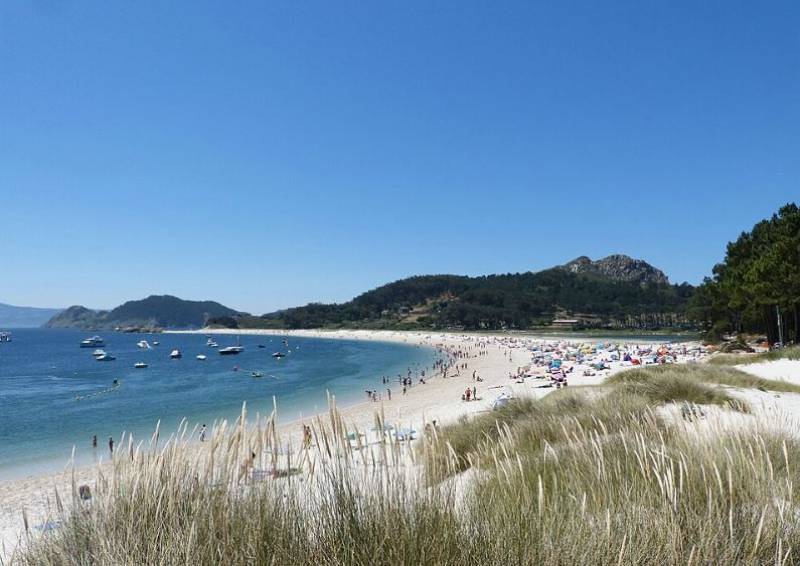 Every year, beach lovers around the world look forward to the rankings of the most stunning beaches on the planet and this year, a little slice of Spanish paradise has made the cut.
Every year, beach lovers around the world look forward to the rankings of the most stunning beaches on the planet and this year, a little slice of Spanish paradise has made the cut.The 2025 edition of the World’s 50 Best Beaches includes just one beach from Spain, and it’s not in the Balearics or along the Mediterranean and we might expect. It’s Rodas beach, tucked away in the Cíes Islands off the coast of Galicia, and it has landed an impressive number 18 spot on the list.
Rodas is famous for its sweeping crescent shape, soft white sand and clear turquoise waters. It’s set in a protected national park and connects two islands with an eye-catching natural lagoon in the middle. Some even say it feels a bit like the Caribbean, just with a touch more Atlantic breeze.
The list is put together by a mix of travel pros and beach experts who vote based on beauty, tranquillity, conservation, wildlife and that special wow factor.
The top three this year are Cala Goloritzé in Italy, Entalula Beach in the Philippines and Bang Bao Beach in Thailand, but Rodas more than holds its own among these global gems.
Check out the full list of the World’s 50 Best Beaches here.
Alicante
If you’re planning to hit the beach in Alicante this summer and like to light up a cigarette while you soak up the sun, you might want to rethink that plan. Especially if you’re heading to the top touristy destinations like Finestrat or Calpe.
Most beaches along the Valencian coast are part of a smoke-free initiative but in many places, it’s more of a friendly suggestion than an enforced rule. You’ll see the signs and posters asking people not to smoke, but no one’s going to fine you if you do.
That’s not the case in Finestrat and Calpe, where lighting up on the sand can now lead to a hefty sanction.
Finestrat was the first to act back in 2020 during the pandemic, introducing a real smoking ban on its La Cala beach. Get caught with a cigarette there and you could be fined up to €750.
Now Calpe is following suit. This summer, the town is enforcing similar fines across all of its beaches. Up to now, only certain areas had restrictions, but now the rule applies to the entire coastline. Smokers will still have access to two small designated areas, one on La Fossa beach and another on Arenal-Bol, but the rest of the beach is now smoke-free.
According to local officials, the goal is simple: cleaner beaches and healthier air for everyone, including those just sitting nearby.
Other towns like Dénia, Xàbia, Benidorm and Altea are also part of the smoke-free beach network, but for now they’re taking a softer approach. There are no fines in place, just signs and public awareness campaigns.
And really, the environmental cost is clear. A single cigarette butt can pollute up to 100 litres of water and takes years to break down. So it’s not just your health that’s at risk, but the beach’s too.
Sadly, discarded ciggies aren’t the only grim addition to Alicante’s shorelines. Beachgoers in were met with a far more unsettling sight over the weekend when dozens of dead rats were spotted floating in the water near Cocó Beach, Urbanova Beach and the sailing school at the Real Club de Regatas.
Denunciamos el colapso del saneamiento en Alicante: los aliviaderos vierten aguas sin tratar al mar… y ya aparecen hasta ratas muertas en nuestras playas. El Ayuntamiento mira a otro lado. Exigimos soluciones.https://t.co/NS4bRqg7xR video en @radioalicante pic.twitter.com/jLHgre6wHA
— Manolo Copé (@manocope) May 18, 2025
The discovery came just days after a major storm hit the area and officials believe the heavy rainfall may have overwhelmed the city's sewage system.
Last Wednesday May 14, torrential rain pounded Alicante, with some areas recording more than 40 litres per square metre in just one hour. The deluge appears to have pushed sewage and debris, including dead rodents, straight into the sea.
The timing was especially unfortunate since it occurred right in the middle of the Alicante Triathlon, causing serious concern among athletes and swimmers who suddenly found themselves uncomfortably close to the floating remains.
The Spanish government is following through on its pledge to upgrade key roads in Alicante province, starting with the busy routes leading to Alicante-Elche Airport.
A new contract worth €12 million has just been awarded by the Ministry of Transport to cover maintenance on several major roads over the next three years. If all goes well, the agreement could be extended for nearly five years in total.
The project focuses on keeping access roads to the airport in top condition as passenger traffic continues to grow. In total, more than 136 kilometres of road in what’s known as Sector 4 will be maintained.
Included in the maintenance plan are the N-340, which runs from Orihuela to the airport, the N-325 between Novelda and Crevillent and the N-332 from Pilar de la Horadada to the airport.
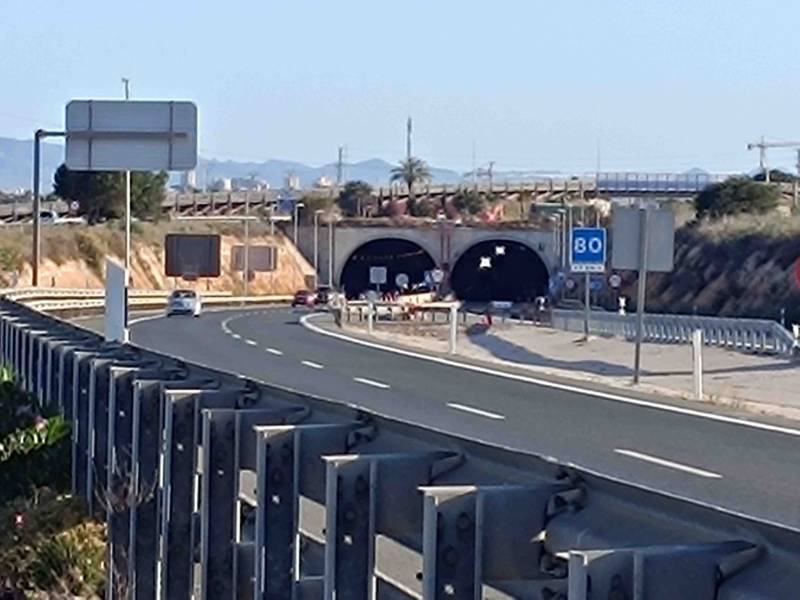 Also covered is the short but strategic N-338, which links the N-332 to the A-70, along with resurfacing work on the N-340 between Elche and Crevillent.
Also covered is the short but strategic N-338, which links the N-332 to the A-70, along with resurfacing work on the N-340 between Elche and Crevillent.At the same time, the AP-7 motorway tunnel in Pilar de la Horadada, which was damaged by a fatal truck crash and fire a couple of weeks ago, should be repaired within a couple of weeks from now, according to concessionary company AUSUR, and contrary to previous reports that it would take as long as two months to repair and reopen.
Andalucía
Sunbathers in Marbella got more than just a dose of vitamin D last weekend when a giant shark was spotted cruising just metres from the shoreline, sparking a mix of awe and alarm among beachgoers.
The creature, later identified as a basking shark, was captured on video by local water sports club Aqua Time Marbella. “Never in our 35-year history have we seen anything like it,” the club posted on Instagram, where the clip quickly went viral.
Initially, only the dorsal fin was visible, but as the shark swam closer, its enormous size left no doubt. At up to 12 metres long, basking sharks are the second largest shark species in the world. Despite their daunting appearance, they pose no threat to humans and feed only on plankton.
Although native to European waters, such close-up sightings are rare along the Spanish coast. The encounter follows a similar one last month near Catalonia, where a 22-foot basking shark was accidentally caught in fishing nets and sadly died before it could be rescued.
On dry land, a serious traffic accident on the AP-7 motorway near Torremolinos last Sunday left 17 people injured, after a collision involving a bus, a lorry and two cars caused complete chaos.
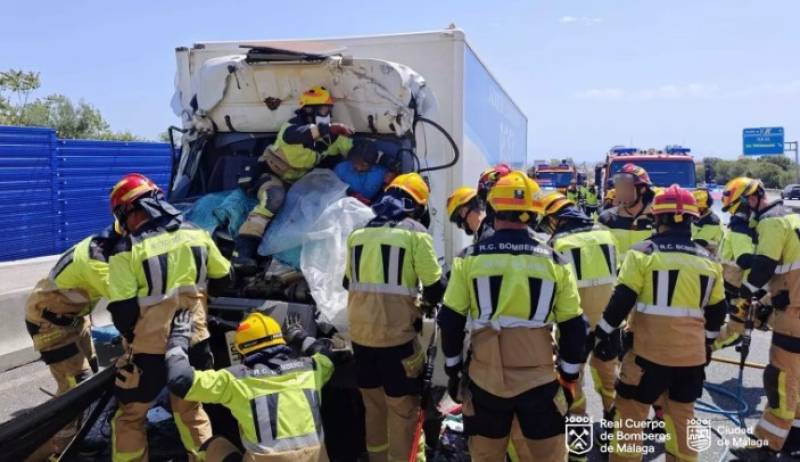
The crash happened just before midday at kilometre 228 in the direction of Cádiz, and initially twelve people were reported hurt. That number later rose to seventeen, with most of the injured taken to local hospitals in Málaga for treatment. Among them were 11 bus passengers and the lorry driver, who was trapped in his cab after the impact.
Emergency crews from the Guardia Civil, local police, fire services and medical teams rushed to the scene. The road was fully closed for several hours, with traffic tailbacks stretching more than two and a half kilometres. Delays were also reported on nearby roads, including the MA-20.
The cause of the accident is still under investigation, but the scale of the response reflected the seriousness of the situation.
If that wasn’t unsettling enough, one flight into Andalucía this week experienced its own emergency… 38,000 feet above the ground and without anyone at the controls in the cockpit. The Lufthansa flight bound for Seville had to make an emergency diversion to Madrid earlier this month, after the co-pilot fainted mid-flight while the captain was briefly out of the cockpit.
The incident took place on an Airbus A321 flying from Frankfurt to Seville. According to the official report, the captain left the flight deck at 10.31am to use the lavatory. While he was away, the 38-year-old co-pilot suffered a seizure and became incapacitated. Attempts to re-enter the cockpit were initially unsuccessful, as the captain received no response.
Just before the emergency override timer on the door expired, the co-pilot regained consciousness and managed to unlock it. The captain resumed control and immediately diverted the aircraft to Madrid, where it landed safely. The co-pilot was taken to hospital and his medical certificate has since been suspended pending further review.
The Spanish Civil Aviation Accident and Incident Investigation Commission has launched a full investigation. Meanwhile, aviation authorities are being urged to revisit the policy of always having two people in the cockpit, a recommendation that many airlines quietly dropped after 2015.
Lastly, there’s a new addition in Cádiz when it comes to options for private health insurance thanks to the arrival of ASSSA Insurance’s latest office in the area.
Conveniently located close to the marina in the exclusive coastal town, the new office offers personal, multilingual service and a wide range of policies tailored to the expat community. ASSSA has been operating in Spain since 1935 and is known for its English-speaking support, transparent policy terms and long-term customer care.
The company emphasises a personal approach, with no call centres or surprise clauses, and they’re highly rated amongst the residential expat community living in Spain for helping to make managing health cover easier and more accessible. Now, it will be even more so for those in and around Cádiz.
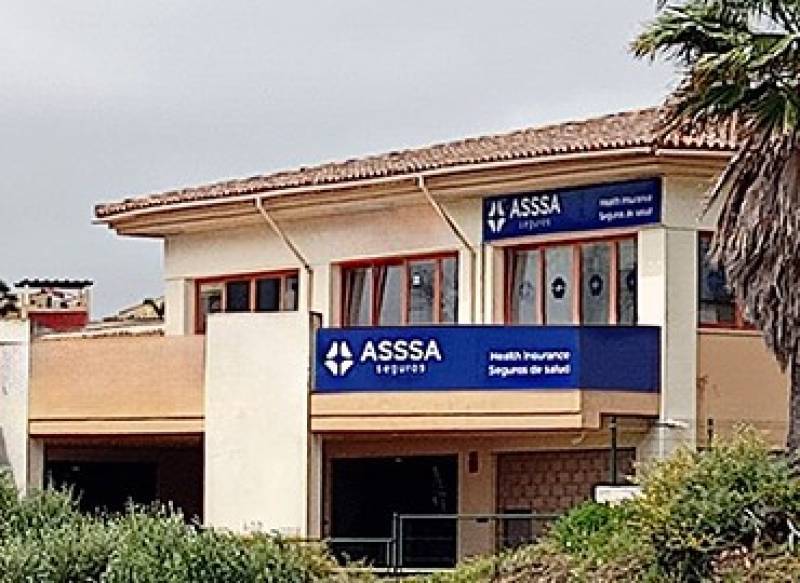
You may have missed…
- Tourist facing €200,000 fine after hurling huge rock into gorge at Spanish national park.
A tourist is facing a potential fine of up to €200,000 after throwing a large rock into a gorge at one of Spain’s most popular natural beauty spots, the Picos de Europa, a reckless stunt that has sparked outrage and a police investigation. - Discover the newest route on the Camino de Santiago – the African Way.
The autonomous city of Melilla now has its own departure point for making Spain’s Camino de Santiago pilgrimage, inaugurating the Way of St James African trail. - Cut in weekly working hours in Spain could mean more holiday days for workers.
As Spain moves closer to reducing the standard working week from 40 to 37.5 hours, employees could find themselves with up to 12 extra days off a year. - Man arrested after more than 50 religious statues stolen from cemeteries in Murcia and Orihuela.
A 49-year-old man from Murcia has been arrested by the Guardia Civil following a string of thefts from cemeteries in the Murcia region and Orihuela, where more than 50 religious statues were taken. The stolen items are estimated to be worth nearly €100,000. - Why green lines are appearing on roads across Spain.
A curious feature has begun drawing attention on roads across Spain: thin green lines painted alongside the white road edges. They may seem new to many drivers, but these markings have actually been in place since 2016 and were designed for a very special reason.
That’s all for this week. Thanks for reading and we’ll be back next week.
’Til then!
Contact Murcia Today: Editorial 000 000 000 /
Office 000 000 000











